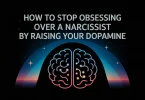MYTH 2: “You Must forgive to heal” (why this is dangerous)
Now, let’s talk about another piece of advice you’ve probably heard: “Just forgive and move on.” It sounds very spiritual and healing, right? But when it comes to NPD abuse, this well-meaning advice can trap you in the abuse cycle.
Premature forgiveness which means forgiving before you fully process what’s happened often leads to incomplete healing. It can leave you vulnerable to falling into similar relationships because you haven’t recognized the warning signs or built proper, healthy defense mechanisms.
Here’s something that might surprise you: You don’t need to forgive to heal. What you need is to understand the manipulation tactics that were used against you. Forgiveness might come later, but it’s not the essential first step everyone makes it out to be.
What works instead?
Building strong boundaries and rebuilding self-trust. Before you even consider forgiving somebody else, you must trust yourself again. Before you’re able to safely extend trust to others, a lot of survivors discover that processing anger is actually a necessary and healthy part of recovery.
Depending on how it’s channeled, anger serves a purpose perhaps as a fuel of sorts because it helps you recognize violations and set boundaries that will protect you in the future. The healthier path is often to focus on accepting what happened instead of forcing yourself to forgive, forget, and let it go.
Acceptance means acknowledging the reality of your experience but not minimizing it. Forgiveness may or may not follow, but that’s completely okay.
Has anyone pressured you to forgive before you were ready? How did that affect your healing process?
Continue reading on the next page
Sharing Is Caring!





